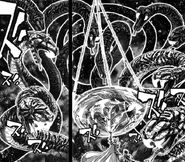| ||||||||||||||||||||||||||||||||||||||||||
Rhea (レア, Rea) is King Kronos's wife and the Queen of the Titans in the manga series Saint Seiya: Episode G. Pontos released Rhea at the same time as the other Titanesses, Current Okeanos and Galaxy Kreios. Like the rest of the Titans, she had fought against the Olympian Gods, her children, in the mythological Titanomachy and was sealed as punishment.
Background[]
Rhea is the daughter of Uranus and Gaia (the Sky and Mother Earth, respectively) and one of the twelve Titans. She married her brother Kronos after he conquered Uranus and became the mother of the six original Olympian Gods (Hades, Hestia, Demeter, Poseidon, Hera and Zeus).
Appearance[]
Rhea is a beautiful woman with long hair (white in some illustrations) with curls at the ends, that look like curling clouds. She had red eyes and is usually seen wearing a mature, serene expression, much calmer than that of her brothers. Rhea almost always keeps her eyes closed.
Personality[]
Rhea is cold and somber, quiet and secretive. Entirely loyal to her husband and king, Kronos, Rhea never forgives those who offend the Titan King. Despite her stoic disposition, she loves her husband and always watches over him.
Plot[]
In the mythological era, Rhea supported Kronos and the other Titans in the fight against Zeus and the Olympian gods, but was betrayed by her sister Mnemosyne. After the defeat of the Titans, Zeus sent Rhea to Tartarus along with her husband and other siblings.
She is awakened by Pontos in the modern era, along with nine other Titans, including her sisters. Her husband awakens soon after, when Leo Aiolia unleashes his lightning on the seal. Before Kronos could be further endangered, however, Rhea and Themis confront Leo Aiolia and Capricorn Shura, summoning the Ge Python. Upon the arrival of Taurus Aldebaran, she transforms the stone serpents into a giant hydra-like form. Aldebaran kills the creature and saves his comrades.
Rhea is later seen summoning a Fire Salamander to destroy Aquarius Camus's Ice Coffin that was blocking the passage between the realm of the Titans, the Time Labyrinth, and the human world. Camus destroys the Salamander, while Rhea is mysteriously turned to stone.
Techniques and abilities[]
Rhea has the ability to summon various creatures according to her desire.
- Ge Python (天地乃蛇(ゲー・ピュートーン), Gē Pyūtōn, lit. "Earth Python" or "Gaia's Python"): A technique which summons huge stone serpents to attack her enemies. Rhea used this technique to attack Leo Aiolia and Capricorn Shura, but her serpents were destroyed by the intervention of Taurus Aldebaran.
- Fire Salamander (炎蜥蜴, Honoo Tokage): A technique which summons a giant flame salamander to attack her enemies. Rhea uses it against Aquarius Camus, to destroy his ice barrier.
- Hydra Summon: Rhea has the ability to transform the "Ge Python" into a more powerful Hydra-like form.
Soma[]
Rhea's armour and weapon is a Soma, gifted to her by her mother, Gaia, in the fight against Uranus. It has the shape of a katar.
These weapons can kill the gods and are more than mere attack tools. They can also change shape to act as armour. They are more durable armours than Gold Cloths. Their freezing point is below the absolute zero.
Trivia[]
- In classical mythology, Rhea (Ῥέα, Rhea) aided the Olympians in the Titanomachy. Upon overthrowing their father Uranus, Kronos received a prophecy foretelling his own downfall at the hands of one of his children with Rhea. After that, each time Rhea gave birth to a child, Kronos swallowed the infant to prevent the prophecy from happening. Appalled, Rhea gave birth to her sixth child, Zeus, in secret and had him hidden away with the help of Gaia. She then deceived her husband by giving him a large stone wrapped in a blanket to swallow instead of her baby. When Zeus grows into adulthood after Rhea protected him, she and Zeus's first wife Metis devised a plan to rescue Zeus's siblings (being immortal gods, although eaten by their father, they were not dead). Rhea and Metis tricked Kronos into drinking a liquid that caused him to vomit up all five of his children as well as the stone, rescuing her children.
- Rhea also appears in an Orphic myth, in which she resurrects her grandson, the god Dionysus, after he is brutally ripped apart by the Titans at the goddess Hera's request.
- Unlike in the Saint Seiya mythos, in the original stories, Rhea is never imprisoned in Tartarus, due to her loyalty to her son Zeus.
- Rhea is also the name of an asteroid, as well as one of Saturn's lesser moons (fittingly, as Saturn is the Roman name for Kronos).
- Rhea's summon, "Ge Python", references one of Gaia's other children, Python, a giant dragon who was the original deity of Delphi sent by Hera (Rhea's daughter) to hunt down another Titan goddess, Leto (Rhea's niece). The attack also represents Rhea's close affinity with the Earth. "Ge" is an alternate name for Gaia, Rhea's mother.
- Rhea's unique summon ability is possibly linked to her role as a mother of gods (creator of life).




